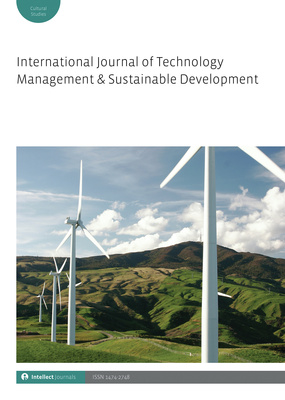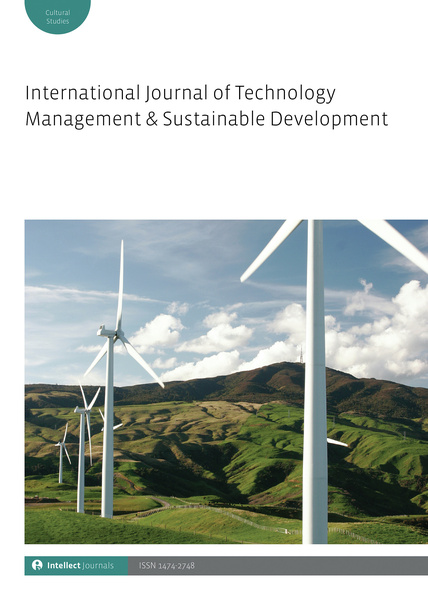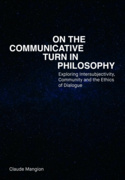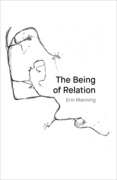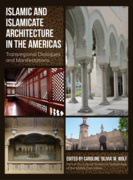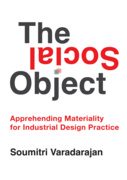General Call for Papers
The International Journal of Technology Management & Sustainable Development (TMSD) is a peer-reviewed multidisciplinary journal dedicated to publishing high quality, original and research-based papers addressing policy issues arising from the relationship between technology and development. In its aim to respond to the growing awareness of the need to understand sustainable development in terms of its underlying dynamics, TMSD draws on a whole niche area of issues in the relationship between emerging knowledge markets, technological management and sustainable development, and seeks to promote discussion of these in the context of globalisation trends, environmental sustainability and the challenge of world poverty.
The main objectives of the journal are:
- To provide expert and interdisciplinary insight into the technology dimension of international development;
- To advance contemporary knowledge about the empirical and theoretical aspects of technology management and sustainable development;
- To provide robust analyses of the problems and prospects developing countries face in their capacity building efforts to harness resources for sustainable use and achieve the overarching goals of poverty reduction and sustainable development;
- To look into strategies for technological capability development and assess their the impact on the economy, the society and the environment, in the light of contemporary experience;
- To offer academics, policy-makers and planners, international development agencies and representatives of business and industry and non-governmental organisations a multi-disciplinary forum for debating and exploring contemporary issues in resource management and development.
The journal's major areas of focus are:
- Science and Technology (S&T) and Research and Development (R&D) strategies;
- Innovation systems;
- Issues in technology transfer;
- Skill development, knowledge management and capacity building;
- Socio-economic and cultural modes underlying the organisation and management of production;
- Environmental sustainability, including climate change vulnerability, management of biodiversity, bio-safety, sustainable energy and sustainable use of natural resources;
- Globalization trends and the implications of these for technology transfer, north-south links and sustainable development.
In both its objectives and orientation, the journal is intended to present complex issues of development and policy in ways that are intelligible to a wide readership cutting across disciplines without, however, having to lose the rigour and weight of analysis. The journal would be of particular interest to those involved in academic research, policy making, environmental management and planning in developing countries.
The journal welcomes general articles, two perspective pieces and two case studies maximum per issue. Perspective pieces offer viewpoints and cutting-edge knowledge of experts in the field who are not necessarily academics; they can be policymakers, practitioners, community leaders and others. They are relatively short in length, between 2500 to 3000 words, focusing the readers’ attention on the latest developments in the field with topics that may relate to sustainability, technology management and business practices.
Case study articles illustrate technology management and sustainable development in practice, these can be based on any part of the economy including industry, civil society, academia and government. The purpose of Case Studies is to exemplify how technology management and sustainability work in real life. These texts should be between 2000-2500 words. All of the texts submitted undergo an editorial review, where the editorial team makes the final decision on publication. Practitioner and policy-oriented articles are not peer reviewed, contributions that present primary research data are therefore excluded.
Perspective and case study articles are submitted using the normal electronic submission system of the journal, the title page of the article should clearly specify the following:
'Submitted as case study article' or 'Submitted as perspective piece'
Websites of Interest:
ERP Environment seeks to establish a forum for discussion and debate on emerging ideas and on recent research findings. It publishes environmental information for policy-makers, businesses, consultants, researchers, academics and NGOs.
Journal contributors will receive a free PDF copy of their final work upon publication. Print copies of the journal may also be purchased by contributors at half price.
Special Issue Call for Papers
Special Issue: 'Reconciling Sustainable Practices, Competitiveness and Economic Development'
Submission dates: 18 April-9 June 2025
Guest Editors:
Abdelhakim Hammoudi, INRAE, Agro-Paris Tech, Paris-Saclay University, Palaiseau, France.
Rim Lahmandi-Ayed, FIAS (Marie-Curie) Fellow, CUT, Rennes School of Business, France & L.R. MASE-ESSAI, University of Carthage, Tunisia.
This Special Issue will be based on a selection of relevant papers to be presented at the 3rd edition of the Mediterranean Day of Economic and Statistic Modeling and Analysis (JM MASE 25) which will take place in University Le Havre Normandie, on 4 of April 2025.
Reconciling sustainable practices, competitiveness and economic development is both a current challenge and a particularly complex research question. The issue of how businesses and states can effectively pursue sustainability objectives whilst achieving competitiveness, and promoting economic development is leading to the emergence of a large body of literature from different disciplines. Addressing this complex and challenging issue requires the use of a multi-disciplinary and holistic approach taking into consideration the evolving dynamics of the global economy and its implications on the complex and changing environmental and societal aspects.
Economic theories on competitiveness have long separated sustainable practices from economic growth strategies. Contemporary research shows that adopting eco-friendly practices can generate efficiency gains, increase brand reputation, and ultimately enhance profitability. Thus, investments in sustainability are no longer seen as mere additional costs but as a strategic lever for competitiveness. Other studies, however, highlight the dilemma of opportunity costs, particularly in low-margin industries or SMEs, where aligning sustainability with financial imperatives remains a challenge. Furthermore, the transition to a sustainable economy requires substantial initial investments, often difficult to implement for businesses under intense competitive pressure. The literature also highlights disparities between developed and developing countries, with the latter sometimes struggling to reconcile their need for rapid growth with sustainable practices. Moreover, economic sustainability requires robust public policies to prevent ‘greenwashing’ and direct companies toward genuinely beneficial long-term practices.
The role of public policies in promoting sustainability and their influence on corporate strategies is a recurring theme. Companies adopt sustainable practices while seeking to balance their investments and financial returns, taking into account the regulatory incentives set up by the governments, such as subsidies, tax credits, or emission quotas. In this perspective, public policies and technological innovation are two important strategic levers for addressing environmental challenges. Investments in research and development (R&D) for clean technologies are crucial to align competitiveness with sustainability. In developing economies, sustainability-related challenges take on a particular dimension. These countries, having urgent issues in terms of poverty/inequality, unemployment, education and health, often face a dilemma between the pressing need for economic development and sustainability requirements.
This special issue aims to explore innovative and balanced perspectives for the complex question of reconciling sustainability, competitiveness and economic development, relying on practical examples and empirical research. By integrating recent theoretical frameworks and diverse case studies, this issue seeks to offer enriching contributions to this debate while shedding light on opportunity costs, the role of public policies, technological innovation, challenges specific to developing economies, as well as implications for poverty/inequality and employment.
TOPICS (non-exhaustive list):
- CSR and Impact on the Competitiveness of SMEs and Micro-enterprises.
- Governance Sustainability
- Green Financing and Responsible Investment.
- Manufacturing Industry and Circular Economy.
- Public Policies, Sustainable Practices, and Competition.
- Public Policies, Sustainable Practices, and Economic Development.
- Social Entrepreneurship
- Sustainability and Poverty/Inequality.
- Sustainability human resources.
- Sustainable Agriculture and Food Security.
- Sustainable Development Indicators and Measurement of Economic Competitiveness.
- Sustainable Innovation and Corporate Competitiveness.
- Sustainable Technology and Innovation.
- Sustainable Tourism and Local Development.
- Sustainable Transition and Social Justice.
- Transition to a Green Economy and its Impact on Competitiveness.
- Transport and Green Mobility
Special Issue: ‘Sustainable Development in the Era of De-connectivity: India Amid Geopolitical and Epidemic Uncertainties’
Guest Editors:
Aravinda Guntupalli, Senior Lecturer, Institute of Applied Health Sciences, School of Medicine, Medical Sciences and Nutrition, Aberdeen University, Aberdeen, UK (Email: aravinda.guntupalli@abdn.ac.uk)
Ingyu Oh, Professor, College of Global Engagement, Kansai Gaidai University, Osaka, Japan (Email: oingyu@kansaigaidai.ac.jp)
Amid ongoing geopolitical shifts, particularly the United States's decoupling and onshoring efforts aimed at reducing dependency on China – its largest trade and foreign direct investment (FDI) partner – India is emerging as a key ‘friend-shoring’ destination. Friend-shoring refers to the relocation of production and supply chain networks from adversarial nations, such as China, to allied or strategically aligned countries. This trend aligns with the Trump administration's push for onshoring, which emphasised bringing entire supply chains back to American soil. Notably, India has benefited from this shift, receiving a relatively low mutual tariff rate of 26% under the Trump administration, compared to China (34%), Vietnam (46%), and other trade allies such as Taiwan (32%).
In the field of international business (IB), sustainable development (SD) and technology management (TM), scholars have historically focused on comparing China and India without fully accounting for China's rapid ascent as a dominant global power and a strategic rival to the United States. Today, India is increasingly positioned as an alternative outsourcing partner for the US, offering a less powerful and less threatening counterpart to China (Prashantham and Birkinshaw 2015; Witt et al. 2023; Siddiqui 2024). India's strategic importance is further underscored by its membership in the Quadrilateral Security Dialogue (QUAD) – a four-country alliance that includes the U.S., Japan and Australia – designed to counterbalance China's growing military influence in the Indo-Pacific region (Kim and Raswant 2022; Rana and Kumar 2023).
While geopolitical realignments like these unfold, the world continues to confront global crises, including pandemics and natural disasters, as exemplified by the COVID-19 pandemic (Oh and Oetzel 2022; Nielsen et al. 2023). These crises have had a profound impact on IB, SD and TM, resulting in disruptions such as supply chain breakdowns, inflationary pressures, and significant business losses. The surge in resilience-related studies reflects growing scholarly attention to global crises but only scratches the surface of their implications for these fields (Sharma et al. 2020; Nguyen et al. 2023).
Against this backdrop of geopolitical disruptions and escalating global challenges, there is a pressing need to reassess India's role as a stabilising force. India holds potential not only as a counterweight to China's dominance but also as a hub for mitigating natural disasters and other crises. However, this dual role remains underexplored in academic research across IB, SD and TM.
We therefore invite submissions that leverage theories from IB, SD and TM to address these emerging dynamics. Contributions may include conceptual or empirical studies that employ qualitative, quantitative or mixed methods approaches. We welcome innovative perspectives that contribute to advancing knowledge at the intersection of geopolitics, global crises and business strategy.
TOPICS (non-exhaustive list):
- The impact of friend-shoring on sustainable development in India.
- Digital transformation and technological leapfrogging in India as an alternative to China.
- Reconfiguring global value chains: The role of Indian SMEs in enabling inclusive and sustainable trade.
- Policy innovation and regulatory frameworks shaping India’s emergence as a global tech and manufacturing hub, especially in the IT and pharmaceutical industries.
- Human capital development and skill mobility in India’s transition toward high-value service and manufacturing sectors.
- India's role in QUAD: Strategic implications for international business.
- Resilience strategies and regulatory frameworks for India in the face of global crises.
- Case studies on India's response to natural disasters or its positioning as a crisis-neutralizing hub.
- Comparative analyses of India’s and Taiwan’s roles in global supply chains amid geopolitical tensions.
- Multinational enterprises’ (MNEs) location strategies in South Asia.
- Theoretical advancements in understanding friend-shoring within IB frameworks.
Submission Guidelines:
The submission period is from 1 August 2025 to 31 October 2025.
Please make sure you select the Article Type 'SI: Sustainable Development in the Era of De-connectivity’ when submitting your paper to Pubkit.
All submissions will go through the TMSD regular double-blind review process and follow the standard norms and processes.
REFERENCES
Kim, J. and Raswant, A. (2022), ‘International Business and Security Nexus in India’, in International Business and Security: Geostrategy in Perspective, pp. 117–160, Cham: Springer International Publishing.
Nguyen, H., Pham, A.V., Pham, M.D.M. and Pham, M.H. (2023), ‘Business resilience: lessons from government responses to the global COVID-19 crisis’, International Business Review, 32:5, p.102166.
Nielsen, B.B., Wechtler, H. and Zheng, L.G. (2023), ‘Disasters and international business: Insights and recommendations from a systematic review’, Journal of World Business, 58:4, p.101458.
Oh, C.H. and Oetzel, J. (2022), ‘Multinational enterprises and natural disasters: Challenges and opportunities for IB research’, Journal of International Business Studies, 53:2, p.231.
Prashantham, S. and Birkinshaw, J. (2015) ‘Choose your friends carefully: Home-country ties and new venture internationalization’, Management International Review, 55, pp. 207–234.
Rana, S. and Kumar, K.A. (2023), ‘Formation of Informal Alliances in Indo-Pacific: Analyzing the Role of India’, Journal of Contemporary Politics, 2:2, p. 50.
Sharma, P., Leung, T.Y., Kingshott, R.P., Davcik, N.S. and Cardinali, S. (2020), ‘Managing uncertainty during a global pandemic: An international business perspective’, Journal of business research, 116, pp.188–192.
Siddiqui, J.A. (2024), ‘Reshaping Global Supply Chain and India: A Quest for Friend-Shoring and On-Shoring’, Global Trade and Customs Journal, 19:3.
Witt, M.A., Lewin, A.Y., Li, P.P. and Gaur, A. (2023), ‘Decoupling in international business: Evidence, drivers, impact, and implications for IB research’, Journal of World Business, 58:1, p. 101399.

